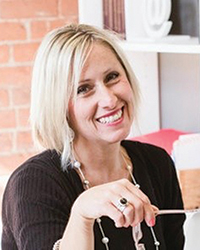
In recent years, we’ve seen a boom in collaborative work environments. These spaces range from coworking spaces like the Cambridge Innovation Center, to the open work spaces like ours at District Hall Providence. Their success shows an unprecedented need and desire for a sense of community across businesses and industries. However, with safety measures in place to encourage social distancing and strict hygiene guidelines, it’s understandable for real estate professionals to fear that COVID-19 could mean the end of coworking culture. But this assumption only focuses on the physical office environments of collaborative spaces, rather than the myriad of other benefits they offer.
District Hall Providence, a not-for-profit space in the epicenter of Rhode Island’s Innovation and Design District, does more than simply rent meeting and event spaces and provide open work space for drop in visitors: it provides entrepreneurs and businesses networking and programming opportunities. By adopting an entrepreneurial spirit, being comfortable in taking risks and always having one foot in the future, we are still able to offer a collaborative working environment in light of the pandemic.
Adapting our business model to our new virtual world taught us valuable lessons, such as agility and planning for an uncertain future. It will also help inform how the real estate industry approaches collaborative spaces going forward.
Having a strong team that can quickly pivot is crucial, especially in times of crisis. Part of this requires teams to never lose sight of its mission. For collaborative spaces, that means maintaining a sense of connection and community, even in this new paradigm. Knowing that the essence of our organization was about to change in light of the pandemic, our team identified opportunities to add value when doing so physically wasn’t possible. Offering virtual programming and networking at our weekly Venture Cafe Thursday Gathering and our online programming series by collaborating with several local partners, allows us to continue to provide real value to our entrepreneurs and innovators. Beyond that, our virtual programming has actually expanded our reach as it provides more flexibility for participants. Pre-pandemic this program normally drew 75-125 in-person participants and has grown to over 180 since transitioning to virtual. This data shows that there is real demand for good-quality programming and networking opportunities online while we cannot connect in person.
It’s important to also keep in mind that the troubles of today are temporary, and now is the time to think innovatively about the future. Professionally and personally, many of us are feeling a loss of community after spending months at home and we, as humans, will never lose our need for in-person connections. When collaborative spaces are able to reopen, we must think about what we can all do to ensure everyone is safe, while also utilizing the content strategy we created while socially distancing. We also should plan to continue to identify ways to offer both in person and virtual experiences to our communities. We can provide tools and platforms that allow businesses to more effectively work in this hybrid mode. District Hall has already started planning to reduce the capacity of each room, while also creating a virtual programming content library to help individuals and businesses — whether they’re in our physical space or not. We are also preparing for the rooms to be used for hybrid use. As we reopen, we may see companies keeping more people working from home but still need flexible meetings and event space for when their team needs to gather.
Now is the time to lean into collaborative working environments instead of assuming that the future of work, and the uncertainty of what that looks like, has no place for them. Coworking and open work space businesses should emphasize their guiding principles — deeper global connectivity, accessibility, and innovation — to ensure these spaces will survive. Virtual and in-person working can, and should, exist simultaneously, and businesses that embrace this mindset will come out stronger. We’ve already seen this trend playing out in the wake of the pandemic, and are excited to navigate our “new normal,” giving people the mix of physical and virtual offerings that they desire.
Tuni Schartner is the executive director of District Hall & Venture Café Providence.







